News
Prime Minister Binali Yıldırım Attends ICI Assembly to Inaugurate Renovated Odakule
- 21.06.2017
- News
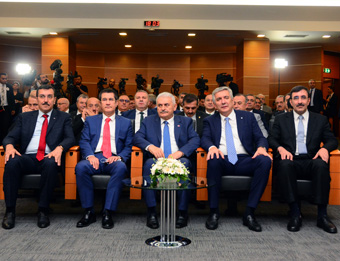
The Istanbul Chamber of Industry (ICI)’s ordinary assembly meeting for June was held in Odakule on June 21, 2017 under the main agenda of “Our Priorities for the Sustainable Growth and Vision of Our Industry in the Process of Bolstering Production Economy”. Moderated by Zeynep Bodur, ICI President of Assembly, the assembly hosted Binali Yıldırım, Prime Minister of the Republic of Türkiye. Prior to the assembly, an opening ceremony was held for the renovated Odakule Assembly Building with the participation of Prime Minister Binali Yıldırım. The ceremony was attended by Deputy Prime Minister Nurettin Canikli, Minister of Customs and Trade Bülent Tüfenkçi, AKP (Justice and Development Party) Vice Chair Cevdet Yılmaz, İstanbul MP of AKP Mehmet Muş, İstanbul Governor Vasip Şahin, Mayor of Istanbul Metropolitan Municipality Kadir Topbaş, and Mayor of Beyoğlu Municipality Ahmet Demircan, among many other guests.
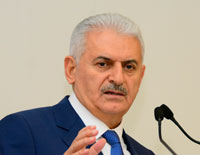
Binali Yıldırım, Prime Minister
of the Republic of Türkiye
Prime Minister Yıldırım experienced the 360-degree view of İstanbul in the roof terrace of ICI’s fully renovated Odakule building before proceeding to the ICI Assembly Meeting for June. In his speech, Prime Minister Yıldırım highlighted the need for increased value added. Indicating that R&D’s share doubled over the last 15 years, Yıldırım said that their goal is to increase its share among GDP to above 3 percent. Yıldırım indicated that while most of the R&D spending was made by the government in the past, the private sector has started to invest in this area as well, underlining that businessmen should not consider R&D investment as a superfluous expense. Yıldırım said, “It is no good if you are doing the same as everyone. If you do what few others do, you will get one step ahead. But if you do what no one else does, then everyone will follow you.

Yıldırım further stated: “Industrialization is a national goal and as important as independence. We will work hard. We will work together. There are much better days ahead of our country. Tomorrow will be better than today. There is no room for despair. Many countries lack the opportunities we have. We have a young population, confidence and stability. Therefore, you should do your part. You should work to scale down our deficit and increase employment. You should assume responsibility for localization and nationalization.”
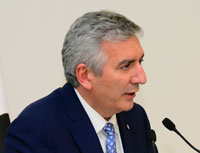
Erdal Bahçıvan, ICI Chairman
Erdal Bahçıvan, ICI Chairman, noted that the industrial growth climbed to 5.3 percent, surpassing the overall growth of the Turkish economy in 1Q17, and added, “We should not crow over this performance. Our objective is ‘high-quality’ growth. We need to take bold steps in order to realize this vision.” He continued his remarks as follows:
“Unfortunately, we have witnessed 15-16 percent rise in loan interests recently. High interest rate is a major obstacle to the transition to a production economy. The banks should consider the real sector as a stakeholder and avoid compromising long-term and healthy business relations in favor of short-term benefit. İstanbul is more than a city of culture, tourism and finance. We need İstanbul and our industry to become more sufficient. Moving our facilities every 10-15 years is a significant waste of resources, vision, and energy. The industry in İstanbul needs a solution to this nomadic existence. The reason for limited industrial investment despite significant incentives is an unfavorable investment environment. An investment environment with increased EU integration, lower risk and stronger confidence in national security would attract both local as well as direct foreign investments.”
Zeynep Bodur Okyay, ICI President of Assembly, delivered the opening speech at the Istanbul Chamber of Industry’s ordinary assembly for June. Addressing the meeting’s main agenda in her speech, Okyay said:
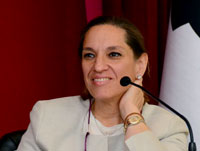
Zeynep Bodur Okyay,
ICI President of Assembly
“Despite challenging circumstances, Türkiye grew by 5 percent in the first quarter, compared to 2.9 percent in 2016. This is in no small part due to the interest-free loans extended to SMEs by KOSGEB (Small and Medium Enterprises Development Organization) and TL 250 billion credit volume guaranteed by the Credit Guarantee Fund. The share of industry in the national growth shows that: Türkiye grows or shrinks hand in hand with the industry. The recent Türkiye’s Top 500 Industrial Enterprises Survey by ICI offered three important results: deterioration in funding structure, decreased share of R&D, and insufficient rise in high-tech production. According to the ICI 500, we are far from where we want to be in financing and technology. It is unclear what the new industrial revolution will bring in the future. We can only remain strong through technology and R&D investment. If we do not start to plan our industrial transformation today, we will lose our competitive power. We should produce technology, rather than procure it. Therefore, as industrialists, we should exploit the support and incentives for R&D investments efficiently.`
Following her speech, Zeynep Bodur Okyay, ICI President of Assembly, invited Erdal Bahçıvan, ICI Chairman, to take the floor. According to Bahçıvan, with 5.3 percent growth, the industry surpassed overall growth of the economy and became the leading driver of growth. Bahçıvan also indicated that the share of industrial products in exports, another driving factor for the growth, was 95 percent, a source of pride for industrialists, he noted. Bahçıvan emphasized that the industry contributes not only to the economy, but also to national morale by boosting prosperity and employment during times of hardship.
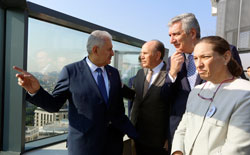
Warning that this growth performance should not lead to lethargy, Bahçıvan stated that it is crucial to keep up the momentum in operations, production, growth and expansion in order to leverage the production economy. Bahçıvan also underlined that their objective is “high-quality” growth. Indicating that high-quality growth is driven by expanding the share of high-value-added industrial products in total production and export, Bahçıvan noted that the production structures of today are yet to reach the desired level. Bahçıvan also mentioned that high-quality growth requires a major leap forward beyond current efforts.
Highlighting that at the İstanbul Chamber of Industry, they continuously bring up the issue of achieving qualitative transformation in production on different platforms, Bahçıvan stated that ICI’s vision supports this qualitative transformation, and their priorities are production-driven growth, increased employment, growth in exports, competitive focus, and higher and more fairly distributed prosperity.

Noting that bold steps are a prerequisite for this vision, Bahçıvan indicated that Türkiye is used to taking brave steps in infrastructure investments, and mega projects such as the Third Bridge, the Third Airport, and Eurasia Tunnel, to which Prime Minister Binali Yıldırım contributed as well, are of utmost importance. Bahçıvan also pointed out that they wish to see similar steps in mega industrial projects which will improve Türkiye’s international reputation and pave the way for global markets.
Bahçıvan continued his remarks as follows:
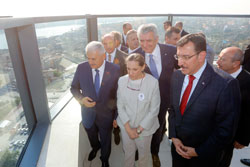
“İstanbul is a city whose star will never fade. We see it as a precious legacy, and should do our best to look after it as such. To that end, there is one thing on which we should place particular focus: Industrial production in İstanbul should be sustained in a manner integrated with the city’s identity. İstanbul is more than a city of culture, tourism and finance. As seen in developed countries, environment-friendly and high-quality production facilities are a natural part of the urban life. İstanbul should be such an example as well. We all need İstanbul and our industry to become more sufficient. In this regard, İstanbul’s industry should be restructured in consideration of the balance between the needs of the city and those of the industrialists. At this point, I would like to mention a very important subject: Moving the industry around İstanbul every 10 or 15 years in parallel with the development of the city is a great waste of resource and vision, as well as of energy. While we need to focus on developing our business, we experience inefficiency due to the concern of moving. The industry in İstanbul needs a solution for this nomadic existence.”
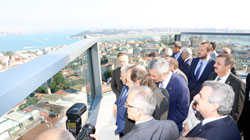
Highlighting that the banks need to carry out their activities in a responsible manner, Bahçıvan noted that there has been 15-16 percent increase in loan interests recently and such high interest rates constitute a significant obstacle to transition to production economy. He also emphasized their belief that banks should consider the real sector as a stakeholder and avoid compromising long-term and healthy business relations in favor of short-term benefit. Underlining the importance for banks to take an encompassing view of the economic environment, Bahçıvan shared that he believed in productivity and value of production-based income, rather than fictitious income. Bahçıvan underlined that they would like to see loan interest rates on a level that supports production, rather than limiting it.
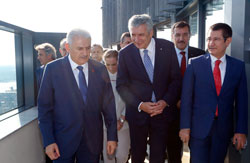
Indicating that promoting production and procurement of domestic goods is one of ICI’s priorities, Bahçıvan said that they organize various activities in order to pave the way for cooperation among the public and suppliers and they will continue to organize such activities in various industries. Noting that they find the growth rates in the first quarter of 2017 unsatisfying in that the investments made a rather limited contribution to the growth despite positive developments, Bahçıvan said that the reason for limited industrial investment despite significant incentives is an unfavorable investment environment. Pointing out to the crucial importance of increasing the attractiveness of the investment environment, Bahçıvan stated that an environment with increased EU integration, lower risk and stronger confidence in national security would attract both local investments and direct foreign investments.
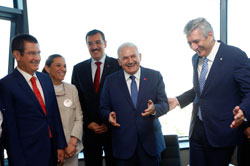
Noting that global connections and collaborations are very important for attracting the foreign capital Türkiye is always in need of, Bahçıvan underlined that European Union is especially important as Türkiye’s primary foreign trade partner. Bahçıvan also stated that EU’s import from non-EU countries during January-April 2017 increased by 10 percent year-on-year, while Türkiye’s export to EU countries only increased by 4 percent to EUR 23.1 billion during the same period. Reminding that South Korea’s export to EU countries rose by 20 percent and India’s by 20 percent during the same period, Bahçıvan stated that Türkiye did not get a sufficient share of the cake during the recovery of the EU economy.

Indicating that Türkiye needs to redefine a sustainable and genuine relationship with the EU with precise schedule and results in order to get its deserved share from the EU market, Türkiye’s largest export market, Bahçıvan said that at ICI, their frequently-raised request for the revision and expansion of Customs Union’s scope in line with the evolving trade conditions remains relevant.
Bahçıvan continued his remarks as follows:
“Mr. Prime Minister, we appreciate your recent constructive approach towards Türkiye-EU relations. You have raised our hopes by pointing out Türkiye’s willingness to advance negotiations for full accession to the EU, and to renew the Customs Union negotiations. As industrialists, we have always believed in the potential of our country. And we will continue to do so, as long as stability and confidence are preserved. With this understanding, we would like to sustain and strengthen our solution-oriented cooperation and close dialogue with our Esteemed President, along with our government and ministries. We trust that tomorrow will be better than today as long as we shoulder the responsibility together and the light of industry continues to enlighten these lands.”

Then, Prime Minister Binali Yıldırım took the floor. PM Yıldırım started his speech by stating that industrialization is a national goal. Noting that industrialism is a passion, and that it was not the most preferable job for making a living, but rather one of the hardest. Everyone can earn money, but getting to produce something was a reward on its own, said Yıldırım, who added that industrialists go through all kinds of difficulties to manufacture their products, but seeing the fruit of their labors takes away all the exhaustion. Underlining that industrialism is a sacred and strenuous job that leaves its mark on the people involved, Yıldırım congratulated the industrialists, commenting that Türkiye has risen on the shoulders of manufacturers and investors, and added:

“The world has been going through a crisis since late 2018. But this year came with good news. This year, the global economic growth was revised up to 3.8. The world is growing, while the global crisis is losing its impact gradually. The global growth seems to be back on track. These estimations are made based on the forecasts for countries, without taking the precise results into account. When it comes to Türkiye, the estimations are revised upon the realization of the growth. They acted hastily after the July 15 coup attempt. We took another blow from credit rating agencies. But we were not dismayed, as we had faith in our nation. Now we are reaping the rewards. Today, we rank third after China and India in terms of growth. We doubled Europe’s growth rate. Now that the constitutional referendum is over, the Turkish economy will be in a much better condition in the coming spring and summer. We will achieve stronger growth. Most people used to sneer at such remarks. These are not prophecies. Throughout our referendum campaign, we also worked in the parliament. Following the U.S. elections, we realized the risks short-term exchange rate shifts and volatilities pose to our country and business, and we took measures. If we had failed to create a credit volume of TL 250 billion, 30 thousand industrialists and businessmen would have gone bankrupt by now.”
Yıldırım noted that the banks further increased their ratios after certain measures were implemented. This did not deter banks from charging high loan interests, said Yıldırım, and warned that the government will take action if the banks do not come up with a reasonable interest rate. Yıldırım noted that they have the means to regulate this matter, but they would rather see this process improve itself as a matter of course. Industrialists expect the banks to do their job, added Yıldırım, and noted that everyone is in the same boat and the financial sector should support society and industry, just as the government did for the financial sector when the time came.
Underlining that 55 percent of the hard-earned industrial revenue was spent as financing expense according to the ICI 500 results, Yıldırım stated that the issue of financing is a great obstacle to Türkiye’s growth. Noting that high interest rates aggravate inflation, Yıldırım said that Türkiye will develop through production, increased employment and investments, and thus attain a more fairly distributed value added and prosperity. He continued his remarks as follows:

“Our duty is to ensure sustainable development. According to the ICI’s Türkiye Manufacturing PMI Report, the index hit 53.5 in May, the highest in the last 3.5 years. Capacity utilization rate in the industry climbed to 78.8 percent, which corresponds to the highest level in the last four years. Production of investment goods rose by 24.7 percent. This points to a stronger growth in the upcoming period. This is a sign for growth. Foreign companies have brought in USD 4.5 billion to our country, compared to USD 3.2 billion last year. We have earned their confidence. Our attraction centers draw foreign and local investors every day. The applications total 100 billion. We received over 3 thousand applications. They pledge 450,000 new jobs.”
Emphasizing that it is a must to increase the price per kilo in exports, Prime Minister Yıldırım said that the value added needs to be raised as well. Indicating that R&D’s share doubled over the last 15 years, Yıldırım said that their goal is to increase its share among GDP to above 3 percent. Yıldırım indicated that while most of the R&D spending was made by the government in the past, the private sector has started to invest in this area as well, underlining that businessmen should not consider R&D investment as a superfluous expense. Yıldırım said, “It is no good if you are doing the same as everyone. If you do what few others do, you will get one step ahead. But if you do what no one else does, then everyone will follow you.
Noting that they will take important steps in order to reduce red tape and speed up business procedures, Prime Minister Yıldırım shared the news of an upcoming reform to the VAT system. Prime Minister Yıldırım reminded that localization and nationalization is based upon certain principles in public procurement, which causes problems regarding current deficit and financing. Yıldırım also noted that the bureaucracy is reluctant to take risks and hence hinders localization and nationalization by implementing traditional procurement policies, and highlighted their determination in this issue.
Underlining the importance of working until reconciliation is reached in severance pay regulation, Yıldırım indicated that the government maintains its mediator role in negotiations without disrupting the balance in staff-employer-workplace triangle. The current labor law is not sustainable, argued Yıldırım, and promised to ensure fairness in this issue as well.
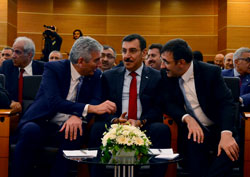
Erdal Bahçıvan, Bülent Tüfenkci,
Cevdet Yılmaz
Stating that “We fully support you in the issue of training,” Prime Minister Yıldırım emphasized that on-the-job and apprenticeship trainings in OIZs will carry Türkiye forward into the future. Yıldırım indicated that the government needed to engage in four areas 15 years ago: security, justice, education and health; whereas it now focuses on two areas only—justice and security— as investors have reached the capacity to invest in education and health now. Noting that they plan to transition to the unified education structure by 2019, which requires 71 thousand additional classrooms, Yıldırım highlighted their efforts on this issue. He also emphasized:
“Industrialization is a national goal and as important as independence. We will work hard. We will work together. There are much better days ahead of our country. Tomorrow will be better than today. There is no room for despair. Many countries lack the opportunities we have. We have a young population, confidence and stability. Therefore, you should do your part. You should work to scale down our deficit and increase employment. You should assume responsibility for localization and nationalization. It is trivial to purchase something pre-made. But Türkiye has the potential to make everything. The private sector is the main pillar of this country. We are unorganized; however, although in disarray, we are progressing, one step at a time. The 65-year old ICI has 18 thousand members. You constitute 16 percent of overall employment. We trust you. We will always stand by you. You are making a living through your hard work and wisdom. You are not simply making a revenue, but are also contributing to the progress of our nation. We are holding production and industry in such high regard than any other sector. Those who create an income for our country should also leave a mark.”
Following Prime Minister Yıldırım, ICI Assembly Members took the stage to share their opinions regarding the agenda.
Following the highlights from members of the ICI assembly, AKP Vice Chair Cevdet Yılmaz delivered a speech. He noted:
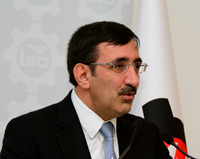
Cevdet Yılmaz, AKP Vice Chair
“This meeting reaffirmed the priority of the industry. Public-private dialogue is critical for success. This dialogue is crucial not only for general politics, but also for specific and production-based issues. We can resolve our raw material problem in foreign-dependent sectors through large-scale clustering.”
Following the speeches, Assembly Members and guests proceeded to ICI’s traditional iftar dinner.